|
Bad News Year
It was a bad, sad
year which saw the loss of Philip Kerr, Reg Gadney, Anthony Lejeune and Jessica
Mann, and a memorial service for Colin Dexter. I considered most of them as
good friends and respected them all.
It was also another
year for the ‘Girls’ in that I spotted at least ten new crime novels with Girl in
the title and I must certainly have missed (or ignored) many more.
 
And the use of the ‘girl
from behind’ (please do not Google that) image for covers remains sadly
ubiquitous despite my cries in the wilderness for the last two years or more….
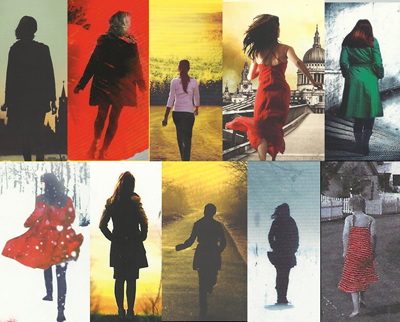
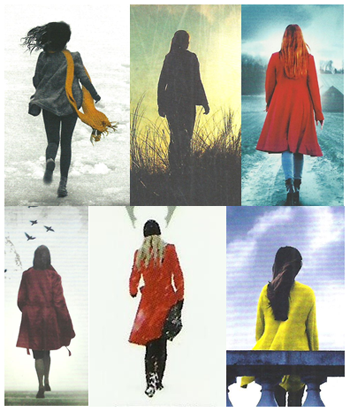
Disclaimers
For legal reasons I
had no idea that there was a new Barney Thomson novel out – Aye,
Barney from Long Midnight Publishing – but as author Douglas Lindsay is
very closely connected with the world of international espionage, one doesn’t
like to complain too loudly.
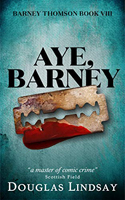
I have, however,
been allowed a sneak preview of his 2019 novel (with a new series hero, this
time a policeman rather than a tonsorial psychopath), of which more later.
And I must recant
last month’s legal disclaimer which stated I knew nothing of the latest Lee
Child Jack Reacher adventure Past Tense published by Bantam. I am
now well aware of it and it is rather good, as I suspected it would be all
along.
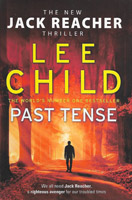
Not a Thorny Problem
A new paperback
imprint, Blackthorn, is to be launched on an unsuspecting crime fiction reading
world in May 2019. A division of Canongate Publishing, Blackthorn has recently
released its first catalogue, which can be viewed on line at https://tinyurl.com/yco93kl2
Among authors to
feature in the first seven months are: David Hewson, Simon Brett, Caro Ramsay,
Paul Doherty and Michael Jecks. Oh yes, and me, just in time for next
Christmas.
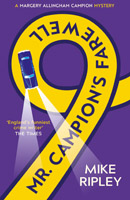
Books of the Month
Just when you were
thinking that the Scandi-crime bubble may have burst, along comes another ‘Swedish
crime sensation’ to brighten the long dark evenings with the tale of a missing
girl and a Stockholm police detective who equates bouts of binge drinking to ‘self-medication’.
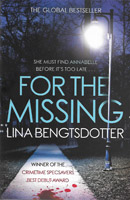
For the
Missing
is a debut novel by Lina Bengtsdotter and is published here by Orion although
it has already been a bestseller in Scandinavia and parts of Europe under the
title Annabelle (the girl who goes missing on page one).
It is a well-paced
thriller with an interesting female police detective called (remember the binge
drinking) Charlie Lager and it is, as far as I can tell from a very sketchy
knowledge of Old Norse, smoothly and inventively translated by Harvard academic
Agnes Broomé.
For a complete
change of scene, how about Kenya, specifically the slums of Nairobi where
making a bonfire out of a passing vehicle is a social gathering?
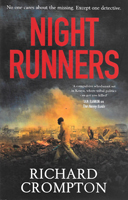
Night Runners, published by Weidenfeld &
Nicolson, is the third novel by former BBC correspondent Richard Crompton to
feature his Maasai policeman Detective Mollel. In Night Runners Mollel
makes his entrance in dramatic fashion in the middle of a violent
protection/extortion racket run by local gangs against the drivers of the mutatu mini-buses which provide much of the
public transport in Nairobi (and don’t have Route Numbers, but titles, such as
Arsenal, God Knows and Beyonce).
Mollel is
fascinating hero, pitted against crime, political corruption and tribal
rivalries; the sights, smells and customs of Kenya are colourfully described,
and the writing is brisk and controlled. If I have a qualm it is because I am
very old and set in my ways and it relates to the way dialogue is indicated by
en-dashes rather than inverted commas. There was something of a craze for reporting
speech (in crime fiction) this way some years ago; I even did a novel myself in
this style in 2002. Whilst
recommending Night Runners most heartily, I hope other crime writers do not
follow Richard Crompton’s example. I have only just got used to ‘single’
inverted commas replacing “doubles” as speech marks. I am not sure I would
survive another seismic change in punctuation.
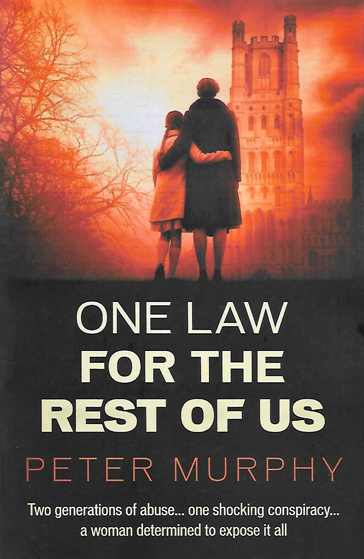
Sadly I am unable
to attend the launch of Peter Murphy’s new legal thriller in Heffers in
Cambridge (despite being invited) this month, as One Law For The Rest Of Us
(from No Exit Press) looks as if it is likely to be frighteningly topical,
dealing as it does with institutional child sex abuse. The cynical reader might
be tempted to observe that Peter Murphy, a lawyer by training, has managed to
produce a thought-provoking novel in the time it usually takes the Government to find replacement chairpersons for the official Independent Inquiry into Child Sex Abuse.
Pick of the Year
It’s that time of
year again, where we are afforded the luxury of looking back and deciding which
books have give us the most pleasure this year, and though I find myself using
the royal “we” I do, of course, mean purely myself.
John Lawton’s Friends
and Traitors (Grove Atlantic) was the best novel I bought this year
(and I have the receipt to prove it). Surely there can be no higher praise. It
really was a hypnotic guide through several decades of treachery within the
British establishment, European politics and Lawton’s fictional Troy family, a
far from dysfunctional family of immigrants when it comes to adapting to
British society. Lawton also manages to slip in a trademark reference to a
favourite character borrowed from Margery Allingham.
Graham Hurley’s Estocada
(Head of Zeus) was a compulsive, convoluted thriller set in the Europe of
1937-38 with a young Luftwaffe ace
and a reluctant British spy pursue different paths to the realisation that war
is inevitable. This is part of Hurley’s outstanding ‘Wars Within Wars’ series,
which really do set a benchmark for 20th-century historical thriller
fiction.
Manda Scott's A
Treachery of Spies (Bantam) is another excellent thriller with a WWII
setting, or rather a wartime backstory, for the story begins with a gruesome
case of murder in Orleans for French police detective Ines Picaut. Her
investigation revolves around what happened in Occupied France in the 1940s,
when the Maquis, aided by Britain’s Special Operations Executive, fought many
enemies, some of them the occupying Germans. Terrifically exciting.
Peter Morfoot’s Bag
of Bones (Titan) was the third outing for Captain Paul Darac, the jazz-loving
Nice (as in France, not as in ‘naughty but’) policeman who has, without doubt,
become my favourite foreign detective created by a Brit since the late Michael
Dibdin gave us Aurelio Zen. Darac’s adventures celebrate the smells, sounds,
food and music of southern France, the plots are satisfyingly complex, the
violence suitably shocking and the jazz is, of course, wonderful.
Jane Harper’s Force
of Nature (Little Brown) is a second novel which proves the author’s
debut – The Dry – was no
fluke. A team-building exercise in the unforgiving Australian outback goes
horribly wrong when five women back-pack their way into the bush but only four
come out. Atmospherically tense, claustrophobic and guaranteed to convince the
casual tourist to stay on the highway and never
get out of the 4 x 4.
Picks of Next Year?
Even the most
cursory glance at new crime titles scheduled for the new year makes one regret
that one no longer has distant aunts sending book tokens, not that book tokens
exist these days either.
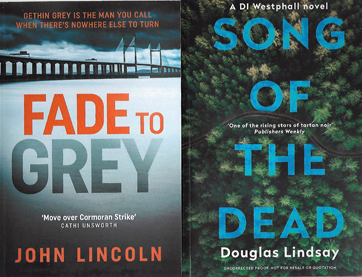
The first pair of
novels on my shopping list appear in February: Fade To Grey by John
Lincoln (No Exit Press) and Song of the Dead by Douglas Lindsay
(Mullholland Books). Both have new protagonists for their authors who
represent, respectively, the best of Welsh and Scottish crime-writing.
Fade To Grey introduces Gethin Grey, a shady
legal eagle with a gambling problem ready to re-open a cold murder case (really
cold, the murderer is in prison) in order to pay the bills. That the setting is
Cardiff (and occasionally Bristol) will come as no surprise once the pen-name ‘John
Lincoln’ is stripped away to reveal John Williams, long-time aficionado of crime fiction and the
author of that seminal guide to American crime fiction Into The Badlands.
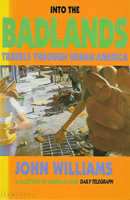
Flying the Saltire
for Scotland, Douglas Lindsay – who gave us the black comedy that was the
accident (and by accident, I mean homicide) -prone life of demon barber Barney
Thomson – introduces a new police detective hero in DI Ben Westphall who,
fortunately for him, comes with a background in MI6 and all sorts of
skulduggery. It will be interesting to see if Douglas can resist the temptation
to fire off a magazine of the stinging one-liners he armed many of his earlier
books with. I do hope he can’t.
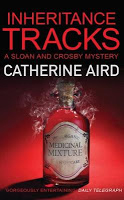
To represent the
rest of the United Kingdom, I will have to wait until April for Inheritance
Tracks by Catherine Aird, from Allison & Busby. I know nothing about this book other
than it is set in Calleshire, a county invented by Catherine and suspiciously
like Kent at times) and features her long-running detective C.D. ‘Seedy’ Sloan,
but that’s good enough for me.
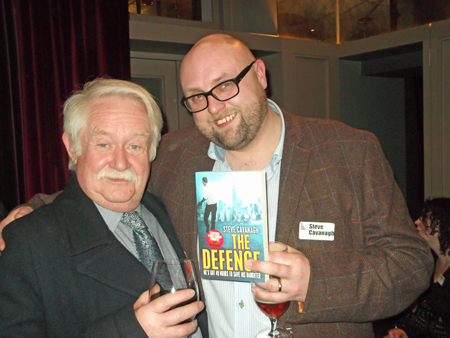
And from Northern
Ireland, even though his books are not necessarily set there, will be the
amiable and highly talented Steve Cavanagh, whom I was delighted to meet before
he became a bestseller. (Which is my way of reminding him it’s his round.) His
new thriller Twisted which is published by Orion in April, looks to be set
in America and revolves around the identity of a mysterious bestselling writer
of crime fiction.
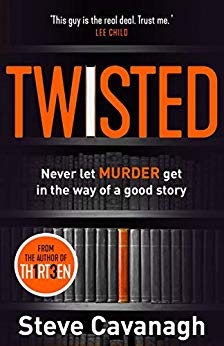
|
|
Further Afield
In October I provided a tiny peek at some of the new titles coming in the New Year from Australia. I can now reveal some more exotic locations for the British reader which may come in useful when foreign travel is banned entirely after Brexit. (Too much?)
I can honestly say I’ve never read a crime novel set in Lapland in 1952 before, so I am looking forward the debut novel Evil Things by Katja Ivar, published by Bitter Lemon in January. At the height of the Cold War, a body is found on the Finnish-Soviet border, which is investigated by police sergeant Hella Mauzer, the first female detective in the Helsinki Homicide Unit now exiled to chilly Lapland for being ‘too emotional’. My old chum Maxim Jakubowski has already read it and describes Hella Mauzer as a memorable character – “a feminist 1952 cop before feminism was invented”.
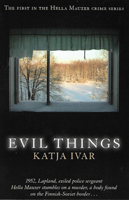  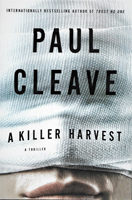
I know I have read crime novels set in South Korea, but not many (perhaps one) written by a South Korean. I can remedy that in February when 4th Estate publish The Plotters by Un-Su Kim, already an award-winning novelist in his native country. The plotters of the title are the big bosses of organised crime in Seoul where the Doghouse Library (not really a library at all) is a front for the crime syndicates and a sort of clearing house for contract killings. All very efficient; until the Doghouse’s most talented hitman, Reseng, starts to operate violently ‘off piste’ as they probably don’t say in Korea. The Plotters looks fascinating, but I am slightly worried that somebody at The Guardian has offered up the promotional blurb ‘The New Scandi Noir’. Oh, I do hope not.
Then in March, I will journey to Middle Earth for the latest novel from one of New Zealand’s leading thriller writers, Paul Cleave. A Killer Harvest, seen here in its American edition, will be published by Hodder & Stoughton and will, I think, prove my theory that Paul Cleave has always leaned (and very successfully) towards Gothic and horror fiction rather than straightforward crime. It puts a new meaning to ‘seeing the world through someone else’s eyes’ and for the moment, I will say no more.
Collector’s Corner
I am not a book collector as such – I acquire a lot of books and keep the ones I like – and certainly not a ‘completist’ but I do have a soft spot for vintage paperbacks with interesting artwork covers and have been known to buy old editions of thrillers I already possess.

Although I have owned at least three different copies over the years, I simply could not resist buying Gavin Lyall’s debut thriller The Wrong Side of the Sky in what I believe was its first incarnation in paperback.
I had never seen this edition, published in 1963 by Hodder, two years after the original hardback, with a wonderful endorsement from the Daily Express emblazoned across the cover: “Best new thriller in Fleming-Ambler vein since Fleming and Ambler.”
And most unusually for a paperback nowadays (though not fifty years ago), there is a picture of the author on the back cover, in this case the young Gavin in full flying kit (he had served in RAF and worked as aviation correspondent for the Sunday Times).
Several of his early thrillers featured flying and pilots not averse to a bit of smuggling on the side; and one reviewer in The Spectator said he was a “jet-age author” who got “the same sort of romance out of beaten-up old Dakotas and their disillusioned pilots as steam-age Robert Louis Stevenson did from a schooner and its pirate crew.”
Only available in electronic form for many years, I believe The Wrong Side of the Sky is now back in paperback from the Bloomsbury Reader imprint, at a price more than double that I paid for my vintage edition, without a picture of the author and, in my not-so-humble opinion, with a cover which no one will get excited about in fifty years’ time.
Self-Explanatory
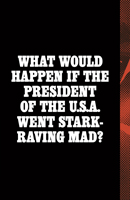 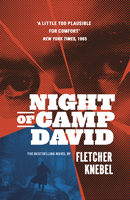
Publisher Vintage has utilised not so much a Spoiler Alert as a prophetic statement to promote the reissue of Fletcher Knebel’s 1965 thriller Night of Camp David, even though the very thought of an American President going of his trolley is surely venturing into the realm of science-fiction, isn’t it? (Please say it is…)
Fletcher Knebel (1911-1993) was no stranger to presidential conspiracy theories and was the co-author of Seven Days in May which became an excellent film by John Frankenheimer, though it is rarely seen these days. I wonder why?
Top Notch Revivals
At the height of ‘The Troubles’ in Northern Ireland, a British army officer called Harry goes undercover in Belfast to unravel a conspiracy involving a Protestant paramilitary force and a Marxist splinter group of the IRA, Betrayal, deception, gun-running and assassination are the order of the day and Harry realises he has been set up as the ultimate fall-guy. Sound familiar? You’re probably thinking of Gerald Seymour’s 1975 trail-blazer Harry’s Game but in fact In Connection With Kilshaw by Peter Driscoll came out the year before, in 1974, and is now reissued as a Top Notch Thriller and an eBook for the first time.
It really is a cracking thriller, which that leading Irish noirista Ken Bruen has described as: ‘One of the great under-valued thrillers of the 70's, a wonderfully fast paced narrative that literally has you holding your breath. The passage of time demonstrates that great writing, great story never age. It is a brilliant edge of the seat novel.'
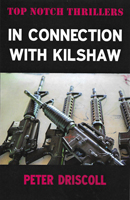 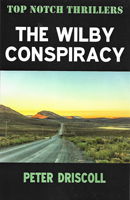
Alongside In Connection With Kilshaw, Top Notch have also republished Peter Driscoll’s breakthrough South African thriller, The Wilby Conspiracy, which first appeared in 1973 and was quickly filmed starring Michael Caine and Sidney Poitier.
Peter Driscoll (1942-2005) emigrated to South Africa with his parents as a child. He became a journalist on the Rand Daily Mail but returned to London in 1968 to write fiction. The Wilby Conspiracy, a classic chase-and-pursuit thriller, was his second novel and received accolades from novelists John Braine and Len Deighton and Eric Ambler called it ‘The best chase story I have read for a long time’.
The novel is notable for its opening scene, an escape from Robben Island, although relatively few in the northern hemisphere were aware of the notorious prison there (or its most famous prisoner) at the time. The cover photograph of the Top Notch edition, showing the road into the High Karoo followed by the fugitives in the novel, was taken by the best-selling South African crime-writer Deon Meyer.
The Curse of Gorkana

I have no idea if this is the logo of a company called Gorkana, or whether it even has one. In fact I am not terribly sure what a Gorkana is although I think it is a resource for hard-pressed Public Relations executives and publicists, providing them with mailing and contact lists of journalists, reviewers, pundits and ‘opinion formers’ (whatever they are) or, in other words (their words), a complete ‘media toolkit’.
I have long resigned myself to the realisation that I was not the sharpest tool in the toolkit, but had thought that I was at least in the toolkit. I suspect I am no longer.
My suspicions were aroused at the start of the year when I was asked why I had not attended a publishing party, to which I replied because I had not been invited. Oh yes, I had, came the response in true pantomime season tradition, but Oh no, I hadn’t as, it transpired, the electronic invitation had gone to an email address listed by ‘Gorkana’ – an address which had gone dark 18 months ago. On hearing of this mysterious organisation, I attempted to contact them to update my details.
In September I was asked by a fellow reviewer what I thought of a number of new crime fiction titles and had to admit I had not seen them, and I realised that the number of review copies I was being sent had declined drastically over the course of the year. Initially I assumed that I had offended a publisher or two (not unknown) but the suspected blacklisting was more widespread, covering publishers I was, historically, on good terms with.
This month I discover that in the media toolkit of Gorkana, my name is listed as a useful contact but without a working email address and my mailing address has now been removed completely, which as one publisher told me “Isn’t really much use.”
I am convinced that being removed from the media toolkit in this way is the reason I appear to have ignored many a new title from authors I know and admire (for which apologies) and the reason why I have not been invited to a single Christmas party this year. Of course that could possibly be because I offended someone last year…
Hush-Hush
As I often ask my readers: who are you going to believe – me, or your very own eyes? Yet I myself did a double take the other day when I thought I had spotted a new edition of James Ellroy’s classic piece of noir, L.A. Confidential.
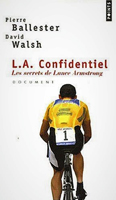
Except it wasn’t a crime novel at all, though it might well qualify as noir, as L.A. Confidentiel (as opposed to Confidential) is the story of Lance Armstrong (‘L.A.’ – geddit?) the controversial cyclist, by sports journalists Pierre Ballester and Dave Walsh. It has, I think, only appeared in French and was first published back in 2006 before the allegations of ‘performance enhancing substances’ became common knowledge.
Actually, it wouldn’t surprise me if James Ellroy did use this as a plot one day, as nothing would surprise me about James.
Dear Reader
I have been asked on numerous occasions over the last year when eBook editions of my last two Angel novels – Angel’s Share and Angels Unaware – were likely to appear, mostly (well, entirely) from a reader in Australia, herself an author and clearly a lady of excellent taste. When I was able to announce that electronic versions of the books had gone live (or whatever it is they do), my Australian Angel fan responded simply: Oh frabjuous day!
I may not have many readers, but ones like that I value.
Corporate Christmas
Being from the North myself, I am much taken with this seasonal design which I will adopt as my corporate Christmas card for this year.

Merry Crimble to One and All*
[* actual number of readers]
The Ripster
|